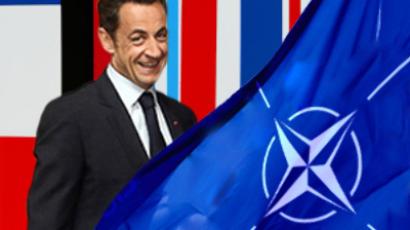Obama calls for closer Russia-NATO ties
NATO sees Russia as an important partner and the ties between them should be developed in many areas, Barack Obama said, speaking on the eve of NATO’s 60th anniversary summit in Strasbourg.
The American president did, however, criticize Russia for its military response to Georgia's attack on South Ossetia last summer.
“I think it is important for NATO allies to engage Russia, and to recognise that they have legitimate interests, in some cases we have common interests, but we also have some core disagreements,” he said.
“I think we should be in a dialogue with them about how to maintain stability, while respecting autonomy and independence of all countries in Europe,” he went on.
“I was a critic of the Russian invasion of Georgia and I think that we have to send a clear message to Russia that we want to work with them, but we can't go back to the old way of doing business,” Obama said.
Obama met Russian President Dmitry Medvedev on Wednesday, ahead of the G20 summit in London. At their first eye-to-eye meeting the two once again confirmed their intentions to ‘hit the reset button’ in Russian-US relations, which have been strained over Washington’s plans to deploy its missile defence shield in Eastern Europe, NATO’s eastward expansion and Russia’s involvement in the conflict in the Caucasus in August 2008.
Yet with the new US administration came a new rhetoric – and the relations between the two states look to be thawing.
The head of NATO, Jaap de Hoop Scheffer, has also shown optimism about the future about the alliance’s relations with Moscow.
“Russia needs NATO and NATO needs Russia – that is the reason that I'm saying we need to get our relationship with Russia back on track,” he said, but not without adding, “I say again, like in 2009, in 2020 we might still have differences over issues.”
Moscow ‘is waiting for real policy change’
Dmitry Rogozin, Moscow's envoy to the alliance, lashed out at the criticism, saying Russia expects positive action and not just words from NATO leaders.
“We are eager to respond to positive signals coming from NATO, but we should differentiate action from words. If they want to pacify Russia to be able to expand eastwards, that’s one thing. But what we are waiting for is real policy change,” he said.
“Barack Obama should distance himself from Georgian President Mikhail Saakashvili, who is a serial killer, and distance himself too from the policy of the Bush administration. That’s one tip to the new US President if he wants to enjoy a good image in Russia,” Rogozin added.
Security measures to cost $150 million
The NATO ceremony kicks off later today, with officials due to arrive in Strasbourg at 18:00 local time, lasting through to April 4, but the event has already been marred by violent protests. Riot police have used tear gas and rubber bullets to disperse angry crowds and more than 300 demonstrators have been detained. Tens of thousands are expected to take to the streets during the two-day summit.
The total cost of the additional security measures is reported to be almost $150 million. 15,000 troops and police have been deployed, and even a temporary military base has been set up in the center of Strasbourg.
The summit will welcome France back into NATO’s military command structure 40 years after it opted out. France is co-hosting the event with Germany and while for Nicolas Sarkozy rejoining NATO is a “oui”, for many French it’s a firm “non”.
What’s NATO’s mission?
Some say the alliance is past its sell-by date:
“As we saw during the Georgia crisis NATO isn’t capable of diffusing a looming crisis, never mind reigning in its partners like Georgia. In fact, enlargement without any clear purpose will only weaken and undermine NATO,” said Adrian Pabst, a Research Fellow at the Luxembourg Institute for European and International Studies.
Created to counter the rising power of the Soviet Union, NATO survived the end of the Cold War and reinvented itself by going global. However, as NATO moved from a defensive alliance to the offensive in Kosovo and now in Afghanistan, many are puzzled about its current purpose.
Afghanistan is the big divisive issue. Nearly half the soldiers currently contributing to NATO’s mission there are American. Even though Barack Obama has committed to sending more US troops, Europe is reluctant to follow, despite insistence from the alliance’s Secretary General.
Relations with Russia are another stumbling bloc for the alliance. John Laughland, Director of Studies at Institute for Democracy and Co-Operation said:
“It’s still being used as an instrument of American geopolitical strategy. And in particular it’s being used for the American goal of encircling Russia and making an enemy of Russia.”
With the Americans having trouble drumming up support, and relations with Russia looming, the alliance may have some tough soul-searching to do.













